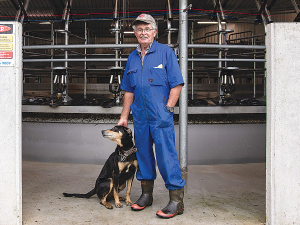Fonterra Suppliers Confident in Mainland Dairy Future
Fonterra's 460 milk suppliers in Australia, who will switch to Lactalis end of this month, are unfazed with the impending change.
 Tokoroa farmer Chris Luxford has reaped benefits from advice given by Fonterra milk quality managers.
Tokoroa farmer Chris Luxford has reaped benefits from advice given by Fonterra milk quality managers.
As a strong dairy cooperative, Fonterra understands the importance of providing comprehensive assistance to farmers, including a range of services at no extra cost.
One of the most valuable of these is the coop’s milk quality service. Working with farmers nationwide to support on milk quality, sustainable dairy practices, animal wellbeing and food safety, the milk quality managers can identify opportunities for improvement and share knowledge from what works on other farms.
It’s a service that has reaped benefits for Tokoroa farmer Chris Luxford.
Chris milks 500 cows on 200 hectares south of Tokoroa. He’s been with the co-op for 40 years, starting his farming career in 1984.
Despite “four companies chasing me” Chris is a keen advocate of Fonterra’s Co-operative model.
“Fonterra sets the milk price based on a reliable model, so a strong Fonterra is good for all New Zealand dairy farmers.”
The co-op’s value isn’t just in the returns and long-term security though, but also things like tailored support from the Farm Source milk quality team, according to Chris.
First a bit of background.
The farm’s somatic cell count (SCC) had been a little bit of an issue for Chris and his team.
“It was the only milk quality issue we had. Although it wasn’t serious, we just couldn’t get it below 150,000. Even with a new cow shed, our cell counts went up by more than 30,000. We just couldn’t work out what was going wrong, and we started to get a bit frustrated because nothing we did would seem to change anything.”
It was then that his key Farm Source contact Vicki Wallace put Chris in touch with the milk quality team.
The specialist team met with Chris on the farm, made observations during milking and provided a range of recommendations.
“They just observed a few things and then we discussed improvements. Within a couple of days, we had a written report to confirm what we had talked about.
“We were already taking standard dry cow therapy steps but one of the things the team and our vet suggested was changing to short acting DCT and teat sealing all cows.”
The results were, in Chris’ words, phenomenal, with the farm’s average SCC dropping dramatically from 195,000 one season down to 110,000 the next.
So dramatic in fact that Chris has now reached Te Tihi status under The Co-operative Difference, the top of the mountain.
“It’s been a real winwin for us,” he says. “Not only with the financial incentive but it’s given our team a real morale boost and has become a real source of pride for them.
“It has also saved a lot of time on-farm. For every case of mastitis you get, there’s a lot involved in running a separate mob – so it simplifies management.”
And Chris’ advice for other farmers who may have been in the same boat is to “go for it because it might be worth a few bob.”
“It’s a free service and you don’t have to implement what they suggest if you don’t want to. You’ve got nothing to lose and maybe a lot to gain.”
Fonterra’s general manager on-farm excellence (milk) Chris Appleby says high quality milk is central to the coop’s success.
“Dairy is who we are and what we do best and our farmers are known for producing some of the finest milk in the world.
“Farmers like Chris take great pride in this so it’s important that we continue to support him, and all of our farmers, when it comes to protecting this reputation.
“We also know that lowering SCC for some farms can be an effective way to improve productivity with no additional inputs, helping to reduce emissions intensity.”
Advice At No Extra Cost
Advice on milk quality is just one of the services the co-op offers farmers for no extra cost.
Others include:
Budou are being picked now in Bridge Pā, the most intense and exciting time of the year for the Greencollar team – and the harvest of the finest eating grapes is weeks earlier than expected.
The Real Estate Institute of New Zealand (REINZ) has released its latest rural property report, providing a detailed view of New Zealand’s rural real estate market for the 12 months ending December 2025.
Rural retailer Farmlands has released it's latest round of half-year results, labeling it as evidence that its five-year strategy is delivering on financial performance and better value for members.
OPINION: "We are back to where we were a year ago," according to a leading banking analyst in the UK, referring to US president Donald Trump's latest imposition of a global 10% tariff on all exports into the US.
DairyNZ says the Government’s proposed Resource Management Act reform needs further work to ensure it delivers on its intent.
Overseas Trade Minister Todd McClay says he's working constructively with the Labour Party in the hope they will endorse the free trade agreement (FTA) with India when the agreement comes before Parliament for ratification.
OPINION: Expect the Indian free trade deal to feature strongly in the election campaign.
OPINION: One of the world's largest ice cream makers, Nestlé, is going cold on the viability of making the dessert.